Burton Grammar School Master (Mathematics 1949-1953, 1958-1979)
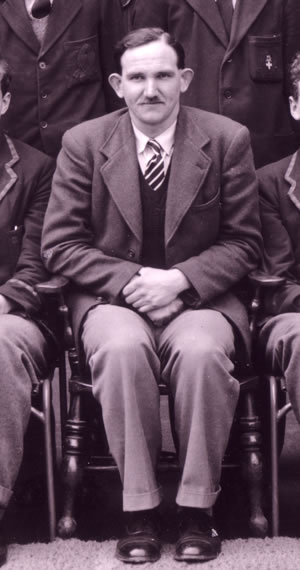 Harry Smith, affectionately known as ‘Brab’, was born in 1923 in Taunton, Somerset. His Grandfather was the pioneering founder of the Ramblers Autobus company which was to establish routes throughout the West Country. Harry’s father eventually took over the running of the company and they had sufficient means to send Harry to the well esteemed Taunton Public School. To this day, Harry can clearly remember the maths teacher, Mr John Evans, who was to have the strong influence on his life that Harry was himself going to eventually have on so many others.
Harry Smith, affectionately known as ‘Brab’, was born in 1923 in Taunton, Somerset. His Grandfather was the pioneering founder of the Ramblers Autobus company which was to establish routes throughout the West Country. Harry’s father eventually took over the running of the company and they had sufficient means to send Harry to the well esteemed Taunton Public School. To this day, Harry can clearly remember the maths teacher, Mr John Evans, who was to have the strong influence on his life that Harry was himself going to eventually have on so many others.
At the outset of the war, all of the company’s buses were ‘requisitioned’ for the war effort. In 1940, Harry had been due to commence at Bristol University but instead, found himself as a private soldier in the Gloucestershire regiment.
Harry still managed to complete some higher Maths education but in 1941 was transferred to the Royal Artillery and, with the 21st Anti-Tank Regiment, saw some very active service in North Africa and later in Italy. On one occasion, he was subject to such heavy bombardment that he suffered from shell-shock and was found with blood running from his ears. He was to lose most of the hearing on his left side which most Grammar School pupils would have been aware of but without due thought.
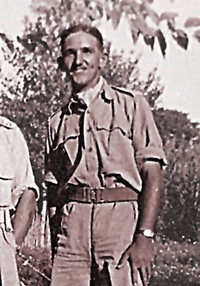 Towards the end of the war in 1945, Harry was made an Educational Officer and sent to Perugia College in Italy to re-educate troop in preparation for their return to normal life. By sheer co-incidence, he found himself teaching alongside his old Chemistry master from Taunton Public School.
Towards the end of the war in 1945, Harry was made an Educational Officer and sent to Perugia College in Italy to re-educate troop in preparation for their return to normal life. By sheer co-incidence, he found himself teaching alongside his old Chemistry master from Taunton Public School.
By now a Captain, he was later sent to Austria where he was involved with the re-alignment of National borders. Addressing locals in Austria, Harry asked for someone to translate. An attractive girl, Helen, was to reluctantly volunteer if he spoke slowly. Not long afterwards, she became his wife!
At the end of the war, Harry was deemed DOV (Deferred as Operationally Vital) and was prevented from returning home, missed his London University place. Taking a teaching certificate in the interim, he was somehow able to later catch up and complete the three year degree in two years.
Hearing about a post at Burton Grammar School from his lecturer in 1949, Harry applied and was appointed by the then headmaster at Bond Street Grammar School, Mr Moodey. His remit was not only to teach his main forte of mathematics, but to also teach Physics and Chemistry. Soon after starting, Harry also found himself in charge of School Rugby. This was in parallel to Norman Jones being in charge of Athletics. Victor Roebuck was soon to join the school as Head of Physical Education but, although also a keen rugby player, his weekend interests were with Burton Rugby club. He was also a Captain with the school’s Army Cadet Corps. along with Major D. Davies.
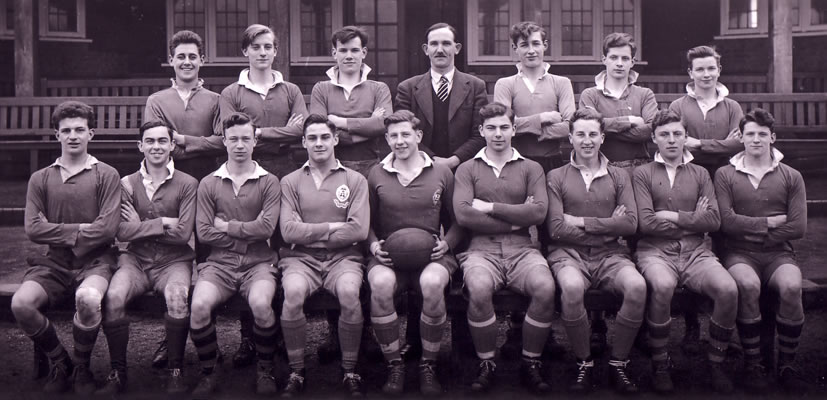 Harry put a great deal of time and effort into this and spent his Saturday mornings on the school rugby field. He was slightly perturbed to discover that Norman Jones received an additional allowance for his running of the Athletics whereas he received nothing. He took up the issue with the Headmaster, Mr Herbert (Horace) Pitchford, who had been appointed to replace Mr Moodey after is tragic recent death. Harry was declined which led to a feeling of resentment for which the school would pay dearly.
Harry put a great deal of time and effort into this and spent his Saturday mornings on the school rugby field. He was slightly perturbed to discover that Norman Jones received an additional allowance for his running of the Athletics whereas he received nothing. He took up the issue with the Headmaster, Mr Herbert (Horace) Pitchford, who had been appointed to replace Mr Moodey after is tragic recent death. Harry was declined which led to a feeling of resentment for which the school would pay dearly.
In 1953, disgruntled, Harry applied for a vacancy at Derby Technical College in the Department of Mathematics where he was enthusiastically appointed. Harry enjoyed his time there because, being a college of further education, there was a link to local industry which led him to involvement with ‘real world’ mathematical applications with companies such as Midland Rail and Rolls Royce, both based in Derby. He was to stay there for six years during which time, Bond Street School was closed to be replaced by the ‘new’ school in Winshill.
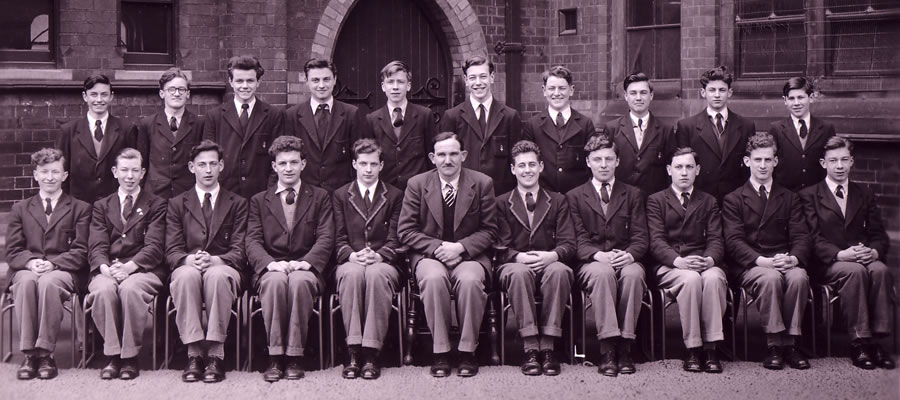 Shortly after the Winshill school was opened, William Gillion was appointed as Headmaster. Mr Gillion, himself a Cambridge Graduate of Mathematics, was a strong advocate of academic excellence and felt that the Mathematics Department at the school, then headed by George Cooper, did not offer provision for the most talented students. He was aware of Harry Smith and had received numerous accounts that he should never have been allowed to leave. So, in 1958, he wrote to Harry asking if we would consider taking over as Head of Mathematics and to run the Open Scholarships, which went beyond ‘A’ Level to prepare the most gifted students for places at Oxford, Cambridge and other Universities of Excellence.
Shortly after the Winshill school was opened, William Gillion was appointed as Headmaster. Mr Gillion, himself a Cambridge Graduate of Mathematics, was a strong advocate of academic excellence and felt that the Mathematics Department at the school, then headed by George Cooper, did not offer provision for the most talented students. He was aware of Harry Smith and had received numerous accounts that he should never have been allowed to leave. So, in 1958, he wrote to Harry asking if we would consider taking over as Head of Mathematics and to run the Open Scholarships, which went beyond ‘A’ Level to prepare the most gifted students for places at Oxford, Cambridge and other Universities of Excellence.
The latter proved sufficient enticement to attract Harry back so he took up the post; George Cooper was to retain a position as a Maths teacher as well as Deputy Headmaster.
Harry also worked for the Welsh Joint Education Committee for 40 years from 1957 during which time, he composed a new ‘Ordinary Alternative’ maths paper every year which was somewhere between ‘O’ level and ‘A’ level. This entailed several trips a year to Cardiff. He was thought of with some affection and on the occasion of him arriving there after 40 years service, they had prepared a special ‘maths’ cake with forty candles on.
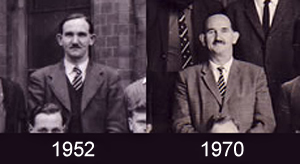 In 1960, Harry helped Bill Gillion to inaugurated a new form 5X to allow the most gifted pupils of form 3A to jump a year so that they would be able to study for Oxbridge entrance exams in their Upper Sixth without having to spend an addition year there. This proved to be tremendously successful and in their out-take year, the class achieved a record number of Oxbridge places, including Scholarships and Exhibitions, actually out-performing Repton Public School!
In 1960, Harry helped Bill Gillion to inaugurated a new form 5X to allow the most gifted pupils of form 3A to jump a year so that they would be able to study for Oxbridge entrance exams in their Upper Sixth without having to spend an addition year there. This proved to be tremendously successful and in their out-take year, the class achieved a record number of Oxbridge places, including Scholarships and Exhibitions, actually out-performing Repton Public School!
Sadly there was strong pressure, both internal and external, to look after the lesser able pupils rather than the brightest so the exercise was never repeated. Harry and other of the school’s most senior teachers saw this as the “start of the rot”.
With a degree of frustration, Harry continued at the Grammar School for a further eighteen years. During this time, he moved house from Scalpcliff Road to Repton and, co-incidentally bought the house from Mr Leech, headmaster of Dovecliff Grammar School and a good friend of William Gillion.
Very tragically, in 1971, his wife Helen, who taught German at the the Technical College and Girl’s High School, was killed in a car accident. He was to mourn for over seven years, unfairly blaming himself, before eventually meeting Diane Bates, an English teacher at the Girl’s High School in 1978 and she became his second wife.
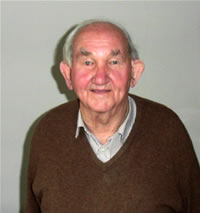 Harry’s time at the Grammar School also included the period where it was to be abolished in favour of becoming Abbot Beyne comprehensive school which led to much greater frustration. Harry himself sees this as “one of the greatest howlers the government has ever made”. His pleas for early retirement were declined so he was to continue at Abbot Beyne for a further three years by which time, he felt that we couldn’t have stood it for a moment longer.
Harry’s time at the Grammar School also included the period where it was to be abolished in favour of becoming Abbot Beyne comprehensive school which led to much greater frustration. Harry himself sees this as “one of the greatest howlers the government has ever made”. His pleas for early retirement were declined so he was to continue at Abbot Beyne for a further three years by which time, he felt that we couldn’t have stood it for a moment longer.
Harry’s son, Michael, was also educated at Burton Grammar School until 1969 went to Leeds University and is a very accomplished linguist.
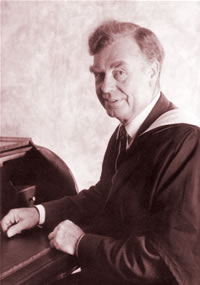 William H Gillion, more affectionately known as ‘Bill’, was educated at Paston Grammar School in Norfolk from where he was successful in gaining a place at Trinity College, Cambridge to read Mathematics. In 1934, he was awarded an Honours degree and he went on to gain an M.A.
William H Gillion, more affectionately known as ‘Bill’, was educated at Paston Grammar School in Norfolk from where he was successful in gaining a place at Trinity College, Cambridge to read Mathematics. In 1934, he was awarded an Honours degree and he went on to gain an M.A.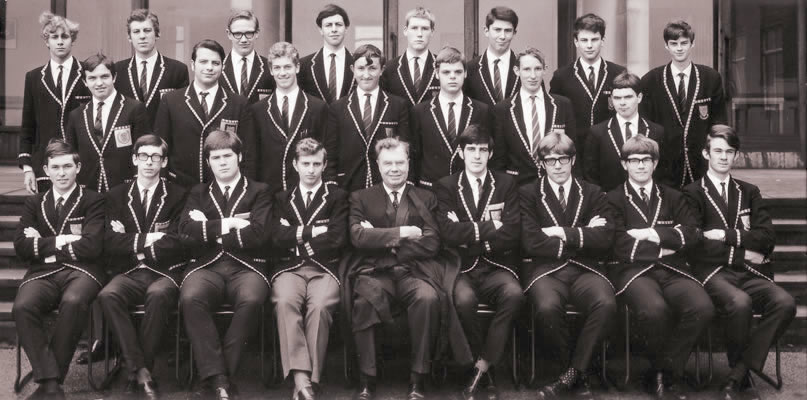 Mr Gillion was tremendously keen as far as academic standards were concerned, and the achievements of the school were never higher than under his headship. In 1960 William, with the co-opted help of Harry Smith, inaugurated a new form 5X. This was a special class that was for the most gifted pupils of form 3A. It meant that group of them would study the fifth form syllabus, with the best available tutoring, in their fourth year to gain a year so that they would be able to study Open Scholarship, which went well beyond normal ‘A’ Level, in their year in the Upper Sixth rather than having to spend an addition year there. Bill’s dream of academic excellence was realised; in a single year, Burton Grammar School achieved fourteen Scholarships and Exhibitions. To put this in context, Repton School achieved eight in the same year!
Mr Gillion was tremendously keen as far as academic standards were concerned, and the achievements of the school were never higher than under his headship. In 1960 William, with the co-opted help of Harry Smith, inaugurated a new form 5X. This was a special class that was for the most gifted pupils of form 3A. It meant that group of them would study the fifth form syllabus, with the best available tutoring, in their fourth year to gain a year so that they would be able to study Open Scholarship, which went well beyond normal ‘A’ Level, in their year in the Upper Sixth rather than having to spend an addition year there. Bill’s dream of academic excellence was realised; in a single year, Burton Grammar School achieved fourteen Scholarships and Exhibitions. To put this in context, Repton School achieved eight in the same year!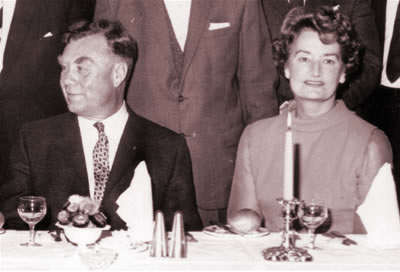 In 1975, two years after he left, the school closed, and was turned into the Abbot Beyne Comprehensive School’s Evershed building. You could almost say therefore, that his career at Burton Grammar School spanned the time of the beginning and the end of the Winshill school.
In 1975, two years after he left, the school closed, and was turned into the Abbot Beyne Comprehensive School’s Evershed building. You could almost say therefore, that his career at Burton Grammar School spanned the time of the beginning and the end of the Winshill school.

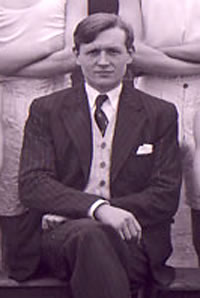 Victor was born in Rotherham, Yorkshire in 1925. He started his secondary education at Maltby Grammar School, one of whose most famous sporting pupils was Freddy Truman.
Victor was born in Rotherham, Yorkshire in 1925. He started his secondary education at Maltby Grammar School, one of whose most famous sporting pupils was Freddy Truman.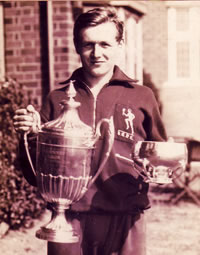 In 1942, he attended Loughborough College of Athletics that has produced many of England’s finest athletes the likes of Sebastian Coe, David Moorcroft and Sir Clive Woodward. In his first year, he won the coveted ‘Victor Ludorum Trophy’ (to save you rushing to Google to find out who Victor Ludorum was, as I did, it is in fact, Latin for “winner of the games”). It was the first time that this had been awarded to a middle-distance winner and Vic went on to win it the following; the first time that this had been achieved too. He also won the ‘Freshers Trophy’ for Athletics and Swimming combined. During this time, aside from athletics, he played for the college rugby team and was cross-country captain.
In 1942, he attended Loughborough College of Athletics that has produced many of England’s finest athletes the likes of Sebastian Coe, David Moorcroft and Sir Clive Woodward. In his first year, he won the coveted ‘Victor Ludorum Trophy’ (to save you rushing to Google to find out who Victor Ludorum was, as I did, it is in fact, Latin for “winner of the games”). It was the first time that this had been awarded to a middle-distance winner and Vic went on to win it the following; the first time that this had been achieved too. He also won the ‘Freshers Trophy’ for Athletics and Swimming combined. During this time, aside from athletics, he played for the college rugby team and was cross-country captain.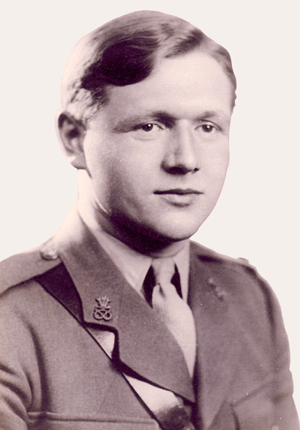 In 1944, his time at Loughborough was cut short with a one year deferment due to the war and was to join the Queens Regiment of the army in Maidstone, Kent. He was soon commissioned to the North Staffordshire Regiment and posted to Northern Italy where he was to patrol the Yugoslav border against gangs of Yugoslav partisans and escaped German prisoners of war. On conclusion of the war and before being demobbed in 1948, Vic played for the Central Mediterranean rugby and athletics team.
In 1944, his time at Loughborough was cut short with a one year deferment due to the war and was to join the Queens Regiment of the army in Maidstone, Kent. He was soon commissioned to the North Staffordshire Regiment and posted to Northern Italy where he was to patrol the Yugoslav border against gangs of Yugoslav partisans and escaped German prisoners of war. On conclusion of the war and before being demobbed in 1948, Vic played for the Central Mediterranean rugby and athletics team.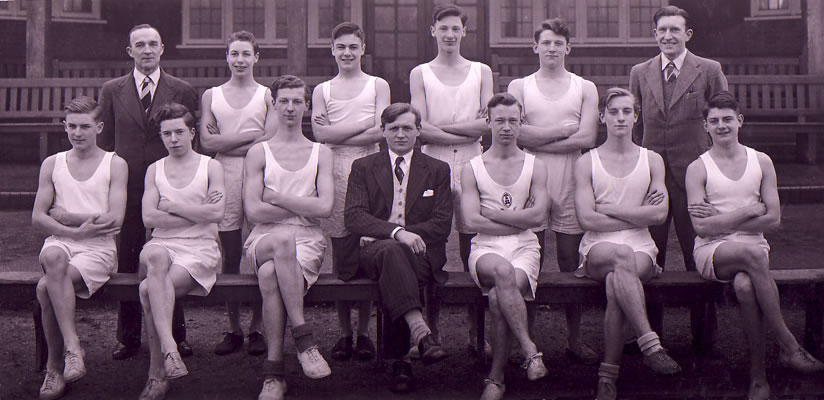 In January 1952, Victor joined Burton Grammar School, Bond Street as Head of Physical Education. Prior to this, the music teacher took PE and exercises were very basic. Immediately, circuit training was introduced with targets to reach bringing a whole dimension that had previously been lacking. Victor was also to develop the existing athletics, boxing, swimming, cricket, cross-country and rugby supporting Jake Hammond, Harry Smith, Jack Adams and Norman Jones. His weekends however, were taken with rugby where as flanker (wing forward in those days).
In January 1952, Victor joined Burton Grammar School, Bond Street as Head of Physical Education. Prior to this, the music teacher took PE and exercises were very basic. Immediately, circuit training was introduced with targets to reach bringing a whole dimension that had previously been lacking. Victor was also to develop the existing athletics, boxing, swimming, cricket, cross-country and rugby supporting Jake Hammond, Harry Smith, Jack Adams and Norman Jones. His weekends however, were taken with rugby where as flanker (wing forward in those days).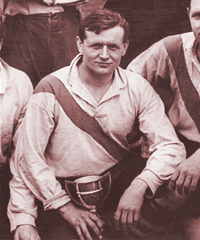 In 1972, Vic left Burton Grammar School and became ‘Secondary Schools Advisor’ for the country borough. Shortly after, he was one of the first four staff coaches for National Rugby Union. A year later, in 1973, Vic spent a few weeks rugby coaching in Poland where he was a little surprised to find that the sport had such a following there. He was later to also spend a short time coaching in Denmark.
In 1972, Vic left Burton Grammar School and became ‘Secondary Schools Advisor’ for the country borough. Shortly after, he was one of the first four staff coaches for National Rugby Union. A year later, in 1973, Vic spent a few weeks rugby coaching in Poland where he was a little surprised to find that the sport had such a following there. He was later to also spend a short time coaching in Denmark.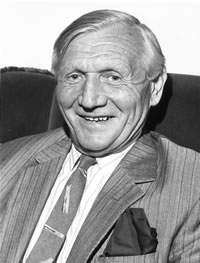 Among other sporting acknowledgements, Victor has been president of the Staffordshire Rugby Coaching Society where he gave practical help to both coaches and individual players; president of Burton Rugby Club as well as President of Staffordshire Rugby. He has also served as chairman of Burton Sports Advisory Council and chairman of Burton Rugby Club, where his membership now spans well over fifty years. There is now a suite named after him at Burton Rugby Club. Some PE teacher!
Among other sporting acknowledgements, Victor has been president of the Staffordshire Rugby Coaching Society where he gave practical help to both coaches and individual players; president of Burton Rugby Club as well as President of Staffordshire Rugby. He has also served as chairman of Burton Sports Advisory Council and chairman of Burton Rugby Club, where his membership now spans well over fifty years. There is now a suite named after him at Burton Rugby Club. Some PE teacher! Harry Smith, affectionately known as ‘Brab’, was born in 1923 in Taunton, Somerset. His Grandfather was the pioneering founder of the Ramblers Autobus company which was to establish routes throughout the West Country. Harry’s father eventually took over the running of the company and they had sufficient means to send Harry to the well esteemed Taunton Public School. To this day, Harry can clearly remember the maths teacher, Mr John Evans, who was to have the strong influence on his life that Harry was himself going to eventually have on so many others.
Harry Smith, affectionately known as ‘Brab’, was born in 1923 in Taunton, Somerset. His Grandfather was the pioneering founder of the Ramblers Autobus company which was to establish routes throughout the West Country. Harry’s father eventually took over the running of the company and they had sufficient means to send Harry to the well esteemed Taunton Public School. To this day, Harry can clearly remember the maths teacher, Mr John Evans, who was to have the strong influence on his life that Harry was himself going to eventually have on so many others. Towards the end of the war in 1945, Harry was made an Educational Officer and sent to Perugia College in Italy to re-educate troop in preparation for their return to normal life. By sheer co-incidence, he found himself teaching alongside his old Chemistry master from Taunton Public School.
Towards the end of the war in 1945, Harry was made an Educational Officer and sent to Perugia College in Italy to re-educate troop in preparation for their return to normal life. By sheer co-incidence, he found himself teaching alongside his old Chemistry master from Taunton Public School. Harry put a great deal of time and effort into this and spent his Saturday mornings on the school rugby field. He was slightly perturbed to discover that Norman Jones received an additional allowance for his running of the Athletics whereas he received nothing. He took up the issue with the Headmaster, Mr Herbert (Horace) Pitchford, who had been appointed to replace Mr Moodey after is tragic recent death. Harry was declined which led to a feeling of resentment for which the school would pay dearly.
Harry put a great deal of time and effort into this and spent his Saturday mornings on the school rugby field. He was slightly perturbed to discover that Norman Jones received an additional allowance for his running of the Athletics whereas he received nothing. He took up the issue with the Headmaster, Mr Herbert (Horace) Pitchford, who had been appointed to replace Mr Moodey after is tragic recent death. Harry was declined which led to a feeling of resentment for which the school would pay dearly. Shortly after the Winshill school was opened, William Gillion was appointed as Headmaster. Mr Gillion, himself a Cambridge Graduate of Mathematics, was a strong advocate of academic excellence and felt that the Mathematics Department at the school, then headed by George Cooper, did not offer provision for the most talented students. He was aware of Harry Smith and had received numerous accounts that he should never have been allowed to leave. So, in 1958, he wrote to Harry asking if we would consider taking over as Head of Mathematics and to run the Open Scholarships, which went beyond ‘A’ Level to prepare the most gifted students for places at Oxford, Cambridge and other Universities of Excellence.
Shortly after the Winshill school was opened, William Gillion was appointed as Headmaster. Mr Gillion, himself a Cambridge Graduate of Mathematics, was a strong advocate of academic excellence and felt that the Mathematics Department at the school, then headed by George Cooper, did not offer provision for the most talented students. He was aware of Harry Smith and had received numerous accounts that he should never have been allowed to leave. So, in 1958, he wrote to Harry asking if we would consider taking over as Head of Mathematics and to run the Open Scholarships, which went beyond ‘A’ Level to prepare the most gifted students for places at Oxford, Cambridge and other Universities of Excellence. In 1960, Harry helped Bill Gillion to inaugurated a new form 5X to allow the most gifted pupils of form 3A to jump a year so that they would be able to study for Oxbridge entrance exams in their Upper Sixth without having to spend an addition year there. This proved to be tremendously successful and in their out-take year, the class achieved a record number of Oxbridge places, including Scholarships and Exhibitions, actually out-performing Repton Public School!
In 1960, Harry helped Bill Gillion to inaugurated a new form 5X to allow the most gifted pupils of form 3A to jump a year so that they would be able to study for Oxbridge entrance exams in their Upper Sixth without having to spend an addition year there. This proved to be tremendously successful and in their out-take year, the class achieved a record number of Oxbridge places, including Scholarships and Exhibitions, actually out-performing Repton Public School! Harry’s time at the Grammar School also included the period where it was to be abolished in favour of becoming Abbot Beyne comprehensive school which led to much greater frustration. Harry himself sees this as “one of the greatest howlers the government has ever made”. His pleas for early retirement were declined so he was to continue at Abbot Beyne for a further three years by which time, he felt that we couldn’t have stood it for a moment longer.
Harry’s time at the Grammar School also included the period where it was to be abolished in favour of becoming Abbot Beyne comprehensive school which led to much greater frustration. Harry himself sees this as “one of the greatest howlers the government has ever made”. His pleas for early retirement were declined so he was to continue at Abbot Beyne for a further three years by which time, he felt that we couldn’t have stood it for a moment longer.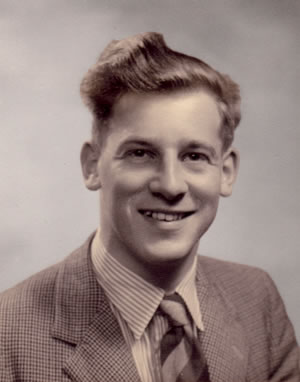 Geoffrey was born in Radcliffe-on-Trent, Nottinghamshire in 1928. He was educated at West Bridgford Grammar School from which he gained a place at Hull University College to take a London BA Honors in Geography from 1947 to 1950.
Geoffrey was born in Radcliffe-on-Trent, Nottinghamshire in 1928. He was educated at West Bridgford Grammar School from which he gained a place at Hull University College to take a London BA Honors in Geography from 1947 to 1950.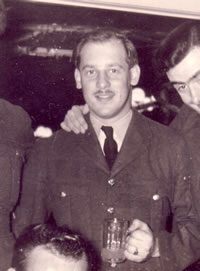 In 1953, Geoff and his now wife decided that they would like to move back to the Midlands somewhere near Burton or Nottingham.
In 1953, Geoff and his now wife decided that they would like to move back to the Midlands somewhere near Burton or Nottingham.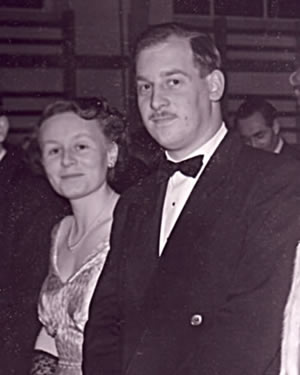 Having been pleased with Geoff’s performance, he was a natural successor so at the start of the following term, Mr Pitchford returned, Mr Cooper resumed to teach maths and Geoff Henton was permanently appointed as geography teacher. All could not have worked out better!
Having been pleased with Geoff’s performance, he was a natural successor so at the start of the following term, Mr Pitchford returned, Mr Cooper resumed to teach maths and Geoff Henton was permanently appointed as geography teacher. All could not have worked out better!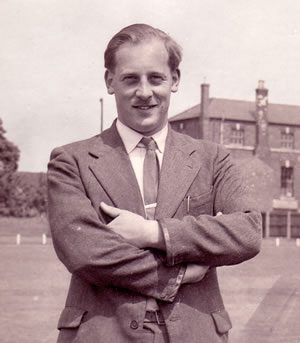 In 1968, George Cooper retired as Deputy Headmaster. At this time, Geoffrey was still second geography teacher under Ron Illingworth as Head of Geography. Harry Smith had not too long earlier returned to the Grammar School to take over the maths department. Although thought of as being the most likely candidate, Harry had made it plain that he had no interest in such a position wanting instead, to concentrate on mathematics and the open scholarships which were his passion. Speculation was that Mr Hugh Wood, Head of the languages department, would be likely to succeed above other heads of department. Nonetheless, Geoffrey decided to formally apply and was interviewed.
In 1968, George Cooper retired as Deputy Headmaster. At this time, Geoffrey was still second geography teacher under Ron Illingworth as Head of Geography. Harry Smith had not too long earlier returned to the Grammar School to take over the maths department. Although thought of as being the most likely candidate, Harry had made it plain that he had no interest in such a position wanting instead, to concentrate on mathematics and the open scholarships which were his passion. Speculation was that Mr Hugh Wood, Head of the languages department, would be likely to succeed above other heads of department. Nonetheless, Geoffrey decided to formally apply and was interviewed.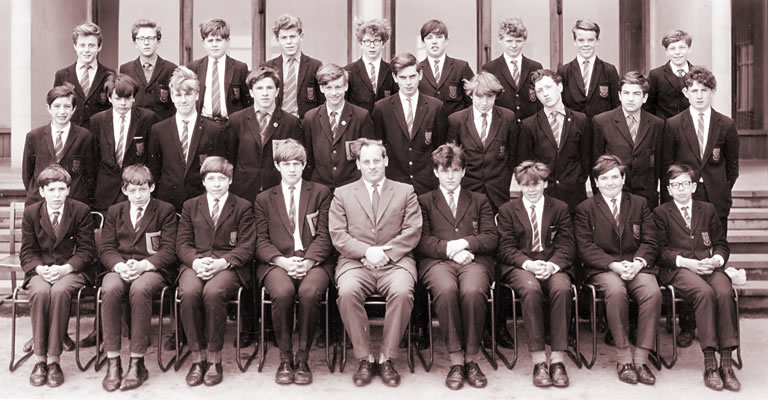 In 1973, William Gillion was to retire as Headmaster in the middle of the year due to external pressures and Geoffrey was appointed acting Headmaster for the remainder of the year until Brian Harris was instated, having been moved from Horninglow Secondary Modern School to oversee the ‘smooth’ transition from Grammar School to Comprehensive. At this point, Geoff reverted to Deputy Headmaster for what was probably going to be the most disruptive period in the school’s history. Geoffrey earned much respect in this period for his strong focus on making sure that the now mixed school students got the best possible education out of the situation as it now was without getting drawn into the politics of either side.
In 1973, William Gillion was to retire as Headmaster in the middle of the year due to external pressures and Geoffrey was appointed acting Headmaster for the remainder of the year until Brian Harris was instated, having been moved from Horninglow Secondary Modern School to oversee the ‘smooth’ transition from Grammar School to Comprehensive. At this point, Geoff reverted to Deputy Headmaster for what was probably going to be the most disruptive period in the school’s history. Geoffrey earned much respect in this period for his strong focus on making sure that the now mixed school students got the best possible education out of the situation as it now was without getting drawn into the politics of either side.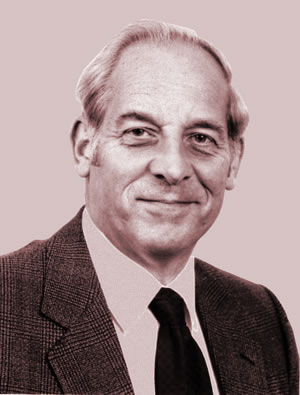 He continued as an effective Deputy Head and geography teacher until he was forced to take early retirement in 1984 due to poor health.
He continued as an effective Deputy Head and geography teacher until he was forced to take early retirement in 1984 due to poor health.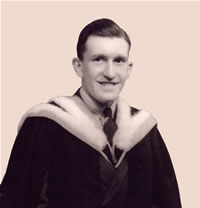 When he graduated three years later, the second world war was quite well advanced and Norman’s knowledge was put to use overseeing the production at the Government Explosives Establishment in Drigg, south of Whitehaven.
When he graduated three years later, the second world war was quite well advanced and Norman’s knowledge was put to use overseeing the production at the Government Explosives Establishment in Drigg, south of Whitehaven. 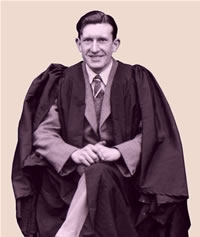 For the first years at Burton Grammar School, Norman lodged with the Binns family in Winshill. When his father began to suffer with his health, his parents moved from Manchester to Winshill and Norman moved in with them. Norman was though, soon to marry and move to Ashby Road where he was to remain for the rest of his life in a home still occupied by his wife, Sheila.
For the first years at Burton Grammar School, Norman lodged with the Binns family in Winshill. When his father began to suffer with his health, his parents moved from Manchester to Winshill and Norman moved in with them. Norman was though, soon to marry and move to Ashby Road where he was to remain for the rest of his life in a home still occupied by his wife, Sheila.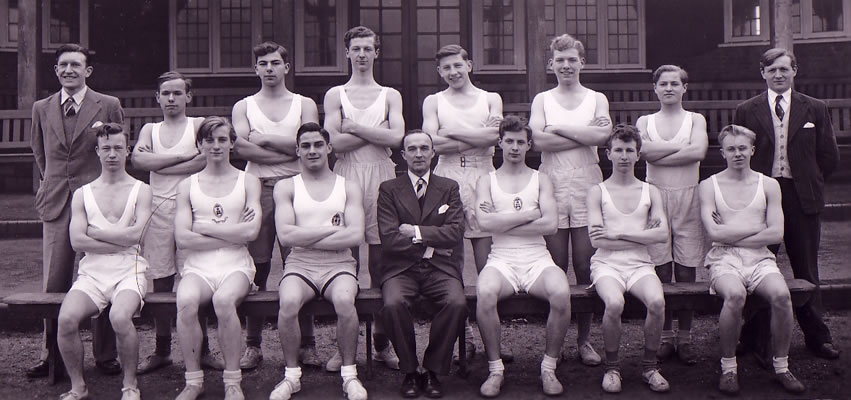 Norman was also heavily involved with school athletics in his early days, having earlier in his life been a promising sprinter. He working together with Victor Roebuck, the appointed PE (Physical Education) teacher, not knowing at this time that the two of them were destined to remain on the Grammar School teaching staff together for many decades to come.
Norman was also heavily involved with school athletics in his early days, having earlier in his life been a promising sprinter. He working together with Victor Roebuck, the appointed PE (Physical Education) teacher, not knowing at this time that the two of them were destined to remain on the Grammar School teaching staff together for many decades to come.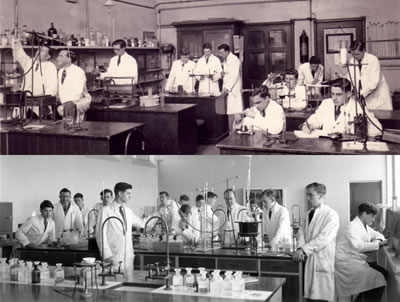 Norman taught at both Bond Street and Winshill and had considerable input into the design of the new laboratories. The original benches at Winshill proved to be too large and had to be hurriedly modified before school was back in session.
Norman taught at both Bond Street and Winshill and had considerable input into the design of the new laboratories. The original benches at Winshill proved to be too large and had to be hurriedly modified before school was back in session.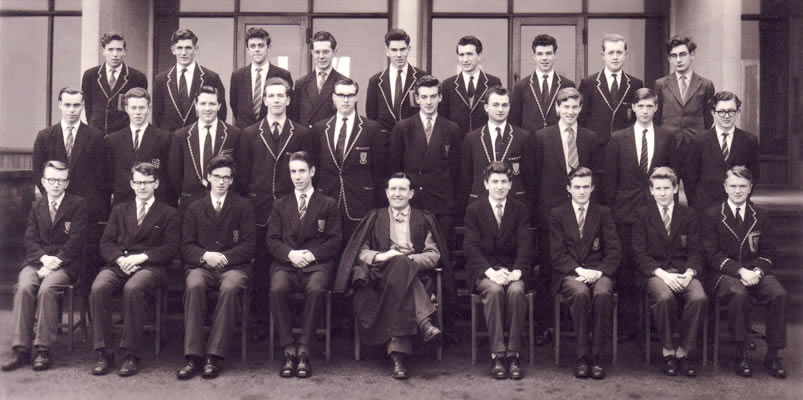 With many photographic slides of his travels, Norman presented a number of illustrative presentations to the Grammar School Sixth Form Society, as well as many outside groups and societies which were very much appreciated by those fortunate enough to attend. The experience had given Norman the yearning to travel and subsequently he became a very keen caravanner, travelling very extensively on the continent with his wife and young son during the long school holidays.
With many photographic slides of his travels, Norman presented a number of illustrative presentations to the Grammar School Sixth Form Society, as well as many outside groups and societies which were very much appreciated by those fortunate enough to attend. The experience had given Norman the yearning to travel and subsequently he became a very keen caravanner, travelling very extensively on the continent with his wife and young son during the long school holidays.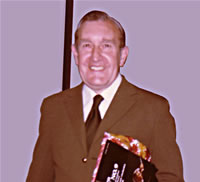 Norman requested early retirement and consequently retired in 1979. Post-retirement, Norman and Sheila led an active and enjoyable life together and made the most of their join love to travel. In what was to be his final year alone, he and his wife travelled to Spain, Africa, and South America. With only minor ailments, his death on June 10th, 2005 came as something of a sad surprise.
Norman requested early retirement and consequently retired in 1979. Post-retirement, Norman and Sheila led an active and enjoyable life together and made the most of their join love to travel. In what was to be his final year alone, he and his wife travelled to Spain, Africa, and South America. With only minor ailments, his death on June 10th, 2005 came as something of a sad surprise.



